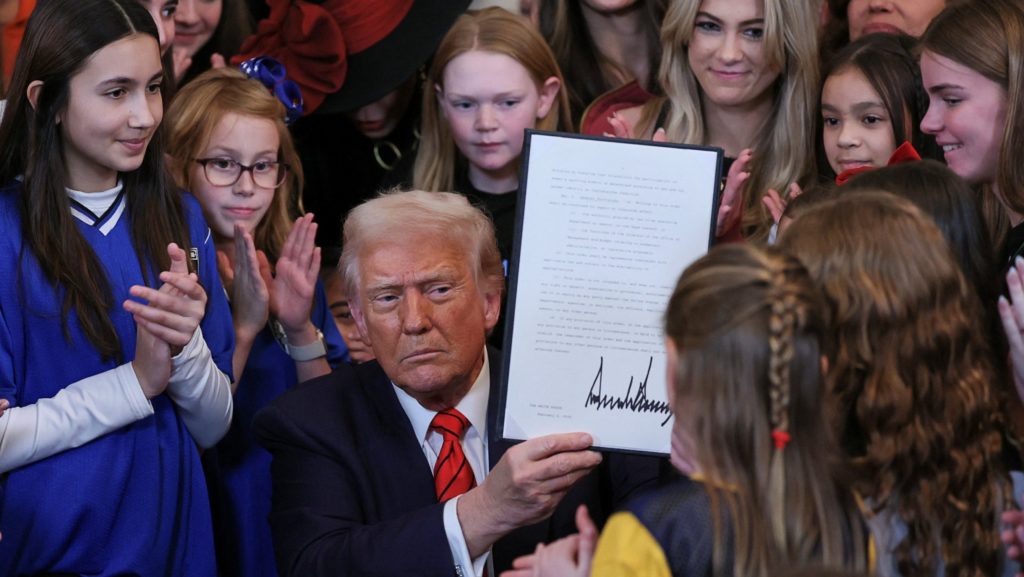The U.S. Supreme Court said July 3 that it would take up two cases concerning state laws requiring student athletes to compete on sports teams that correspond to their biological sex rather than their gender identity.
The attorneys general of West Virginia and Idaho, alongside attorneys from Alliance Defending Freedom, asked the high court last year to uphold their states' laws, both of which were previously blocked by lower courts.
The Supreme Court, which recently concluded its 2024-2025 term, said it would hear the cases in its 2025-2026 term, which will begin in the fall. The court took up the Idaho and West Virginia cases shortly after it upheld a Tennessee state law banning certain types of medical or surgical gender reassignment procedures for minors who identify as transgender.
West Virginia Attorney General JB McCuskey said in a statement, "It's a great day, as female athletes in West Virginia will have their voices heard."
"The people of West Virginia know that it's unfair to let male athletes compete against women; that's why we passed this commonsense law preserving women's sports for women," McCuskey said. "We are confident the Supreme Court will uphold the Save Women's Sports Act because it complies with the U.S. Constitution and complies with Title IX. And most importantly: It protects women and girls by ensuring the playing field is safe and fair."
Idaho Attorney General Raúl Labrador added, "Women and girls deserve an equal playing field."
"I am thrilled the U.S. Supreme Court has agreed to hear our case. For too long, activists have worked to sideline women and girls in their own sports," Labrador said. "Men and women are biologically different, and we hope the court will allow states to end this injustice and ensure men no longer create a dangerous, unfair environment for women to showcase their incredible talent and pursue the equal opportunities they deserve."
Joshua Block, Senior Counsel for the ACLU's LGBTQ & HIV Project, said in a statement, "Like any other educational program, school athletic programs should be accessible for everyone regardless of their sex or transgender status."
"Trans kids play sports for the same reasons their peers do–to learn perseverance, dedication, teamwork, and to simply have fun with their friends," Block said. "Categorically excluding kids from school sports just because they are transgender will only make our schools less safe and more hurtful places for all youth. We believe the lower courts were right to block these discriminatory laws, and we will continue to defend the freedom of all kids to play."
Lambda Legal Senior Counsel Tara Borelli added in that statement that their client, who identifies as a transgender girl, just wants to play sports "with friends and peers."
There is no clear data on how many athletes who identify as transgender compete on teams opposite their biological sex in the U.S., as many sports associations do not track those numbers. A 2022 study by the UCLA Williams Institute found that there are approximately 1.6 million people in the U.S. who identify as transgender, with nearly half of that population between the ages of 13 and 24. However, a January 2025 JAMA Pediatrics study found fewer than 1,000 U.S. adolescents with commercial insurance and a gender-related diagnosis received puberty blockers from 2018 through 2022, and none of them were under the age of 12. The study did not include minors covered by Medicaid.
NCAA President Charlie Baker told a Senate panel in December that out of more than 500,000 total college student athletes in the organization, he believed fewer than 10 were transgender.
In guidance on health care policy and practices released in March 2023, the U.S. Conference of Catholic Bishops' Committee on Doctrine stated the church's opposition to interventions that "involve the use of surgical or chemical techniques that aim to exchange the sex
characteristics of a patient's body for those of the opposite sex or for simulations thereof."
"Any technological intervention that does not accord with the fundamental order of the human person as a unity of body and soul, including the sexual difference inscribed in the body, ultimately does not help but, rather, harms the human person," the document states.

